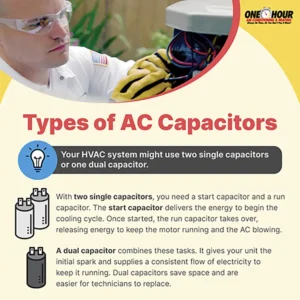Ya know that big shiny cylinder connected to your AC unit? That’s the AC capacitor, and it’s super important for keeping you cool during Tampa’s extremely hot temperatures. Without it, your air conditioning system would be like a car trying to start with a dead battery and you’d never be able to set your thermostat at the right setting.
 Overview of an AC Capacitor
Overview of an AC Capacitor
What does an AC capacitor do?
So what exactly does this magic cylinder do? It gives your AC’s motors that initial jolt of electricity they need to get going. It stores up electricity and then releases it in quick bursts to kick the motors into gear for the cooling cycle.
But its job doesn’t stop there! Once those motors are humming, the capacitor keeps feeding them a steady stream of power to keep the cool air flowing in your AC system.
How are AC capacitors rated?
These capacitors come rated with a voltage and microfarad number. The voltage is like the speed that electricity zips through, while the microfarads tell you how much electrical juice the capacitor can hold. Getting the right specifications matched to your AC unit is integral to repairing your AC.
Warning
Capacitors are high-voltage components, so they can really pack a wallop if you don’t know what you’re doing. Don’t try playing amateur AC technician! Leave any capacitor wrangling to the pros (like our One Hour AC technicians) unless you want to risk a nasty shock or further damage.
Are air conditioner capacitors necessary?
Yes. AC units are power-hungry beasts, especially when they’re firing up that cooling cycle. The capacitor’s job is to deliver that huge surge of electricity to get things started and then maintain the proper power flow. No capacitor means no start and an inefficient, struggling system.
Common Issue
In fact, a bad capacitor is one of the most common AC ailments. If your unit won’t kick on, keeps shutting off randomly, or just isn’t blowing cold like it should, the culprit could be a capacitor not doing its job right. You might hear some humming noises, smell something burning, or even see some smoke – all bad signs. And a subpar capacitor will run up your electric bills as your air conditioning unit labors harder.
Types of Capacitors
Start Capacitors
Start capacitors provide the necessary energy to initiate the cooling cycle. They give a significant boost to start the motor but disengage once the motor reaches a certain speed.
Run Capacitors
Run capacitors maintain motor operation during the cooling cycle. They provide a steady stream of energy to keep the motor running efficiently.
Dual Capacitors
Dual capacitors combine the functions of start and run capacitors. They offer the convenience of single capacitors but can handle both tasks, saving space and simplifying maintenance.
Signs of a Bad AC Capacitor

Symptoms
Several symptoms can indicate a bad AC capacitor. These include:
- Delayed or no start of the cooling cycle
- Random shutdowns of the AC unit
- Absence of cold air
- Humming noise from the unit
- Smoke or burning smell
- Increased energy bills
Common Causes of AC Capacitor Failure
Capacitor failure can result from various causes such as physical damage, overheating, wear and tear, short circuits, power surges, or lightning strikes. These factors can compromise the capacitor’s ability to function correctly.
How are AC Capacitors tested?
Testing an AC capacitor requires professional tools and training. It’s not recommended for DIY’ers due to the high-voltage nature of the electrical components and the specific knowledge needed to diagnose issues accurately.
Can I replace an AC capacitor myself?
The actual replacement is definitely not a DIY job though unless you really know your way around high-voltage circuits. Hiring an HVAC pro is by far the safest bet to avoid any nasty shocks or further system damage.
At the end of the day, that humble capacitor is like the battery powering your AC unit’s motors. When it’s on its game, you stay blissfully cool. When it falters, you’ll wish you had put on an extra layer of deodorant! If something seems amiss, get an expert set of eyes on it quickly. After all, would you really want to sweat through another Tampa summer?
Resources:
